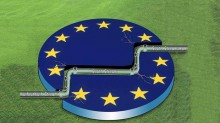The European Commissioner for Energy, Guenther Oettinger, is going to Moscow to see Russia’s Minister for Energy Aleksandr Novak. He announced this in an interview with the German publication Frankfurter Allgemeine Zeitung (FAZ). As the European commissioner’s press service told The Day, the visit is scheduled for August 29. The European side suggested and the Russian side accepted this date. “In a telephone conversation on July 7, 2014, Mr. Oettinger, Deputy President of the European Commission, and Mr. Novak, Russia’s Minister for Energy, agreed to plan a bilateral meeting to further discuss energy security issues. The European Commission suggested doing so on August 29, 2014. The Russian side immediately approved this,” says the answer of the energy commissioner’s press office to The Day’s inquiry.
According to the message, the European commissioner hopes that the Moscow bilateral meeting will pave the way to a new round of trilateral consultations between the EU, Russia, and Ukraine. So Oettinger offers again to be an intermediary, or, as he once said, an “arbiter,” in these consultations.
The Day has written a lot about Mr. Oettinger’s first “mission.” In brief, “thanks” to Mr. Oettinger, we applied to the Arbitration Institute of the Stockholm Chamber of Commerce a month too late – after Gazprom had filed a suit of its own against Ukraine. And those consultations seemed to involve two sides instead of three, as a trilateral format envisages. The point is that Mr. Oettinger’s position was strangely consonant with that of Russia – to “force Ukraine to a compromise” and to propose that the gas issue be raised to the presidential level.

REUTERS photo
What goal is Mr. Oettinger pursuing this time, traveling to Moscow with a proposal of mediation?
In the FAZ interview published the other day, Oettinger says he intends to make a new attempt to settle the problem and ensure “uninterrupted energy supplies to Ukraine.” But the true goal of this visit seems to be a bit different. As Mykhailo Honchar, president of the global research center Strategy XX, commented to The Day, the EU fears that the Kremlin may well “shut off the valve” to Europe in the coming winter. By the Russian logic, the Europeans are breaching the contracts by reselling to Ukraine the gas they bought from Gazprom. “The Europeans are ready to remain in contact with Russia. They are aware of a dire need to persuade Russia to resume supplying gas to Ukraine in order to minimize the risks of transit disruptions,” Honchar notes. But the experts emphasizes that Russia and Ukraine also need the talks to be resumed. Unless a compromise is reached, the winter may deal a painful blow to all the three parties, with the buyer having cold homes and the seller having empty pockets. So, Honchar is sure that trilateral negotiations will be resumed. And there are chances to make a deal, “but only if Europe drops the look-on position it has been taking in the past six months and takes a joint stand with the Ukrainian side,” Honchar says.
Another problem, the expert stresses, is the way the question will be formulated at this meeting. This must be changed radically. “If they go on talking about debts and gas prices, this will produce no effect,” Honchar says. “They should give up the existing approaches, when Gazprom demands money from us and we demand a price cut from it. We need a temporary solution – for example, to sign an interim agreement for six months or a year, perhaps until the time the Stockholm Arbitration announces its ruling, but at least for the nearest heating season (from October to March inclusive), which would solve the problem.” For example, the expert suggests reapplying the scheme that existed between Ukraine and Russia in the early 1990s. “Russia will use gas, not money, to pay Ukraine for the transit of gas to the EU. In the 1990s the proportion was as follows: 110 billion cubic meters of the pumped gas fetched Ukraine 30 billion cubic meters of gas. Why not apply this scheme now? No questions about prices and debts… In this case we could all go through the winter without problems,” he says.
Honchar sees no essential danger to Ukraine in the fact that Oettinger is meeting Novak tete-a-tete in Moscow, but he still stresses that the well-established Moscow-Brussels and Moscow-Berlin links should be kept in view. “There is no shadow of a doubt that Russia will attempt to impose its own vision of the situation on Oettinger. But we can see that, although Oettinger displays pendulum-type approaches, he will be trying to take an unbiased stand. But, naturally, one way or another, all the formal and informal deals made at the Moscow-Brussels and Moscow-Berlin level are influencing the European Commission’s position on the whole,” he points out. Yet, according to Honchar, Ukraine has created a reliable protective device to prevent the EU, including its energy commissioner, from sliding to the Kremlin’s side. It is transparency.
“We should go on acting as transparently as we are doing now. Our transit is transparent for Europe. We show online how much gas we have in the storage facilities. We invited European observers to monitor this transit independently at the borderline gas stations. All this is dealing a staggering blow to Gazprom’s propaganda, particularly the claims that if Ukraine is not yet stealing gas from Russia, it will begin doing so very soon. Our transparency does not allow Gazprom to impose its viewpoint on Europe. This argument no longer works. But the Russians are resourceful and may as well find new ‘arguments,’” the expert concludes.








